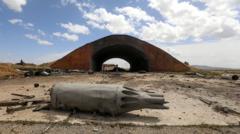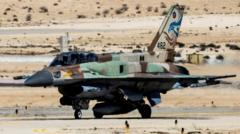Amid the recent upheaval from civil war to a new regime, Syria's Easter festivities become a litmus test for the newly established government, raising concerns among religious minorities.
Syria's Easter Celebrations: A Test for New Leadership

Syria's Easter Celebrations: A Test for New Leadership
Syria's religious minorities cautiously observe Easter celebrations as the new government faces scrutiny over its commitment to inclusivity.
In the heart of Damascus, Easter took on a significant meaning this year as it coincided with a historic transition. Just five months after the ousting of President Bashar al-Assad, celebrations at the Melkite Greek Catholic cathedral, Al Zeitoun, echoed the themes of resurrection and revival. Bishop's sermon linking Jesus Christ’s Resurrection to the rebirth of Syria marked the occasion, symbolizing hope for many citizens. However, the transition leaves many questions unanswered.
The new leadership, under President Ahmed al-Shara, has pledged to foster an inclusive atmosphere, a promise met with apprehension from non-Sunni communities. While Sunni Muslims have largely supported the government’s ascendance, the historical apprehensions of religious minorities from the Assad era linger.
For Christians in Syria, particularly those celebrating Easter under a new regime, the celebrations were a significant test. Would the new leadership, emerging from conservative Islamic roots, uphold a secular approach that allows peaceful religious observances? The atmosphere at churches like Al Zeitoun and the Orthodox Armenian Church, bustling with worshipers, reflected a cautious optimism, though skepticism still existed about long-term tolerance.
As families gathered in celebration, many remained watchful of the new power dynamics and what they might mean for religious freedoms in a country where religious stratification played a significant role in the political landscape. While Easter celebrations proceeded without incident in Damascus, the true challenge for the nascent government lies ahead: ensuring that freedoms extend to every citizen, irrespective of their faith.
The new leadership, under President Ahmed al-Shara, has pledged to foster an inclusive atmosphere, a promise met with apprehension from non-Sunni communities. While Sunni Muslims have largely supported the government’s ascendance, the historical apprehensions of religious minorities from the Assad era linger.
For Christians in Syria, particularly those celebrating Easter under a new regime, the celebrations were a significant test. Would the new leadership, emerging from conservative Islamic roots, uphold a secular approach that allows peaceful religious observances? The atmosphere at churches like Al Zeitoun and the Orthodox Armenian Church, bustling with worshipers, reflected a cautious optimism, though skepticism still existed about long-term tolerance.
As families gathered in celebration, many remained watchful of the new power dynamics and what they might mean for religious freedoms in a country where religious stratification played a significant role in the political landscape. While Easter celebrations proceeded without incident in Damascus, the true challenge for the nascent government lies ahead: ensuring that freedoms extend to every citizen, irrespective of their faith.





















